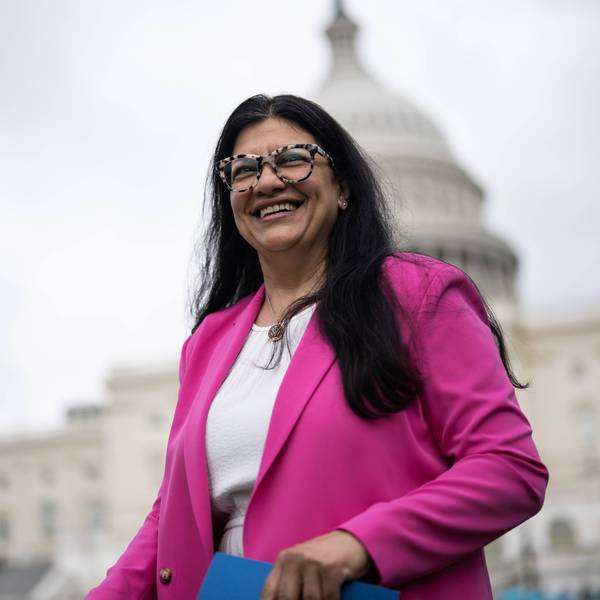In his 1944 State of the Union Address, President Franklin Roosevelt articulated popular American hopes and aspirations by calling for a Second Bill of Rights--an Economic Bill of Rights for all Americans.
Polls conducted by the White House in 1943 had revealed that after the war Americans wanted guaranteed healthcare, guaranteed employment, and guaranteed aid to students.
The increasing concentration of wealth, the widening inequalities, and the intensifying crisis of American democratic life demands that we advance this call now.
Empowered by those findings, FDR declared, "We have come to a clear realization of the fact that true individual freedom cannot exist without economic security and independence. 'Necessitous men are not free men'... We have accepted, so to speak, a second Bill of Rights under which a new basis of security and prosperity can be established for all regardless of station, race, or creed."
All of which is as true today as it was 78 years ago.
Therefore, we are proposing a 21st Century Economic Bill of Rights--a Bill of Rights we call on all progressive candidates and officeholders to embrace.
A 21st Century Economic Bill of Rights will guarantee all people residing in the United States the right to the essentials of a good life regardless of their income, race, religion, gender, sexual orientation, or country of origin.
A 21st Century Economic Bill of Rights will establish that all Americans are entitled to:
1. The right to a useful job that pays a living wage, and to a voice in the workplace through a union and collective bargaining.
2. The right to comprehensive quality health care.
3. The right to a complete cost-free public education and access to broadband internet.
4. The right to decent, safe, affordable housing.
5. The right to a clean environment and a secure planet.
6. The right to a meaningful endowment of resources at birth and a secure retirement.
7. The right to sound banking and financial services.
8. The right to recreation and participation in public life.
This roster of rights represents our draft for a 21st Century Economic Bill of Rights. As we go forward, there are other proposals we might consider--and from which we have already drawn elements. In the 1960s, labor and civil rights leader A. Philip Randolph proposed a Freedom Budget inspired by FDR's Four Freedoms--Freedom of speech and worship, Freedom from want and fear--and in 1968 Martin Luther King, Jr. called for an Economic Bill of Rights. In 2018, economists Mark Paul, William Darity, and Derek Hamilton laid out a nine item 21st Century Bill of Rights. And in 2020, Bernie Sanders issued a six-point Economic Bill of Rights as part of his campaign for the Democratic presidential nomination. Most recently, Wisconsin state assemblywomen Kristina Shelton and Francesca Hong have proposed a Wisconsin Economic Justice Bill of Rights.
We can debate the nuances of those proposals later. The increasing concentration of wealth, the widening inequalities, and the intensifying crisis of American democratic life demands that we advance this call now.
Embracing this 21st Century Economic Bill of Rights will draw a sharp distinction between Progressive Democrats and centrist Democrats as well as Republicans: Only Progressive Democrats truly stand for the type of economy and society which the overwhelming majority of Americans yearn to secure.
Progressive Democrats support the proposition that not only the rich, but all Americans deserve economic security and a promising life.
Progressive Democrats support policies that assure health care, housing, and retirement security as human rights.
Just as President Roosevelt's Second Bill of Rights did in 1944, our Economic Bill of Rights lays out a blueprint for a more prosperous and inclusive America with expanded liberty for all in a healthy and vibrant democracy.
Progressive Democrats support not only well-funded public education, pre-K through college and graduate and professional study, but also eliminating the student-debt trap for past, present, and future generations.
Progressive Democrats support policies that actually address the climate emergency by reducing fossil fuel production while incentivizing investment in renewable energy and high-road, environmentally-sound domestic manufacturing.
Progressive Democrats support a 21st Century Economic Bill of Rights as a truly universal declaration, applicable to everyone equally without exception; and, thus, as a powerful weapon against structural racism.
Progressive Democrats--in decided contrast to both "moderate" or "corporate" Democrats and "conservative" or "reactionary" Republicans--support a platform of economic policies designed to enable Americans, all Americans, to secure the nation's promise of life, liberty, and the pursuit of happiness and make America progressively better in the process. Indeed, we reject both the cynicism that says we can do little to remedy the endemic social ills that have caused so many to lose faith in our national project and the arguments of those who favor retreat or the status quo.
Believing that Americans are tired of fatalism and pessimism, we present a call to action for positive democratic renewal and growth. Drawing on the words of the late Congresswoman Barbara Jordan we say: "What we want is very simple--we want an America as good as its promise."
Just as President Roosevelt's Second Bill of Rights did in 1944, our Economic Bill of Rights lays out a blueprint for a more prosperous and inclusive America with expanded liberty for all in a healthy and vibrant democracy. And just as FDR's coalition of labor, civil rights, and liberal organizations confronted fierce opposition from corporate and conservative forces, we expect ours will as well.
Nonetheless, determined to enhance freedom, equality, and democracy and dramatically improve the lives of all Americans, we call upon all progressive candidates and officeholders to embrace our proposal and seek to enact a 21st Century Economic Bill of Rights.
Indeed, we invite everyone to help us build the America it projects.




